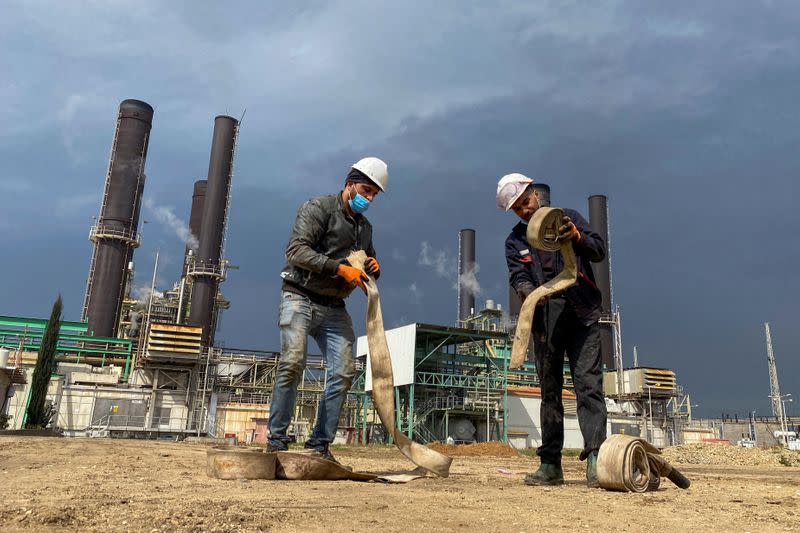By Ari Rabinovitch and Nidal al-Mughrabi
JERUSALEM (Reuters) – Negotiations over a gas pipeline that would cross political flaws and provide reliable energy for the impoverished Gaza Strip have moved from the abstract to the concrete in recent weeks, three officials with knowledge of the process told Reuters.
For years, the project was a distant prospect because of the Israeli-Palestinian conflict – peace negotiations between the two sides were interrupted in 2014 and were never resumed, amid mutual suspicions and outbreaks of violence.
But the interests of Israelis, Palestinians, Qataris and Europeans have converged in recent weeks with the aim of making gas flow to Gaza in 2023, officials said.
The plan would see natural gas from the deep-water Leviathan field operated by Chevron in the eastern Mediterranean to flow through an existing pipeline to Israel, and from there to Gaza via a proposed new extension.
According to the agreement, which has not yet been finalized, the Israeli side of the planned pipeline would be financed by Qatar and the stretch in Gaza paid for by the European Union, officials told Reuters.
If successful, the pipeline project, for the first time in years, will provide a stable source of energy for the Gaza Strip, ending blackouts that have helped to paralyze the economy of the blocked Palestinian enclave.
“We are talking about Gaza having 24 hours of electricity, providing a basis for great economic growth and contributing to peace and stability,” said Ariel Ezrahi, energy director for the Quartet’s Office, a group that promotes peace efforts among Palestinians and Israelis reporting to the United States, United Nations, European Union and Russia.
“The recent events have been a real breakthrough,” said Ezrahi, who chairs the Gas for Gaza task force, funded by the Dutch government since 2015.
LEVIATHAN
The Quartet’s office predicts that Palestinians initially buy around 0.2 billion cubic meters (BCM) of gas per year, perhaps increasing to 1 BCM as the plant expands and other consumers join.
The European Union pledged an initial 5 million euros last week to finance the Gaza part of the pipeline, which will be about 4 km long and will cost around 20 million euros.
Qatar’s envoy to the Gaza Strip, Mohammed Al-Emadi, told the Gaza news agency SAWA last week that his country would finance the Israeli segment of the pipeline, which officials say will be 45 km long and will cost about EUR 70 million.
Palestinian and Israeli officials told Reuters that Qatar is ready to pay for the gas pipeline in Israel. Emadi’s office and Qatar government press office did not respond to Reuters questions.
Israel’s Leviathan field is already exporting gas to neighboring Jordan and Egypt.
Asked about the Gaza pipeline, Chevron said it hopes to “support Israel’s strategy to develop its energy resources for the benefit of the country and the region”, but did not comment “on issues of a commercial nature”.
Its main Israeli partner in Leviathan, Delek Drilling, declined to comment.
SEALED
Gaza, home to two million Palestinians, is a 360 square kilometer coastal enclave that lies between the Egyptian Sinai peninsula and Tel Aviv.
It has no access to the outside world, except through Israel, which controls 90% of its land and sea borders, and Egypt, which has a narrow land border to the south.
Both countries maintained a rigid block for years, citing security concerns about the Islamic militant group Hamas, which took control of Gaza in 2007.
Today, Gaza’s only plant produces electricity for about 12 hours a day on diesel, a more expensive and polluting fuel.
The pipeline will allow the plant to double, perhaps quadruple, the generation capacity. The Quartet’s office estimates it will add more than $ 1 billion to Palestinian gross domestic product.
POLICY AND POWER
Although a cheaper and more reliable source of energy can alleviate the economic situation of the inhabitants of Gaza – thus contributing to the stability of the region – few expect it to be a panacea.
In fact, the power station at the end of the proposed pipeline has already been shown to be vulnerable to politics.
In 2006, it was bombed by Israel after Hamas militants in Gaza captured an Israeli soldier in a border attack.
And in the past decade, a close dispute between Hamas and its main domestic rival, President Mahmoud Abbas, has seen the two sides accuse each other of aggravating the power crisis.
Abbas’ Palestinian Authority, backed by the West, will handle final negotiations with the Israeli gas company, Palestinian officials said.
Vice President of the Palestine Electric Company (PEC), Walid Salman, said he expected an agreement to be reached in weeks – allowing electricity costs to fall by 60% and generation to double to a maximum of 140 megawatts.
He said that they have been talking to Delek about a 5-year gas business.
In Israel, Energy Minister Yuval Steinitz said the project was being done “in full coordination with us”.
That includes the defense establishment and the state-owned Israel National Gas Lines, whose CEO said plans for a 24-inch pipeline that could carry “significant amounts of gas” are ready.
They are waiting for a final agreement, perhaps in the next few weeks, to begin construction.
(Nidal al-Mughrabi reported from Gaza; additional reporting by Ghaida Ghantous and Rami Ayyub; editing by Stephen Farrell and Mike Collett-White)
